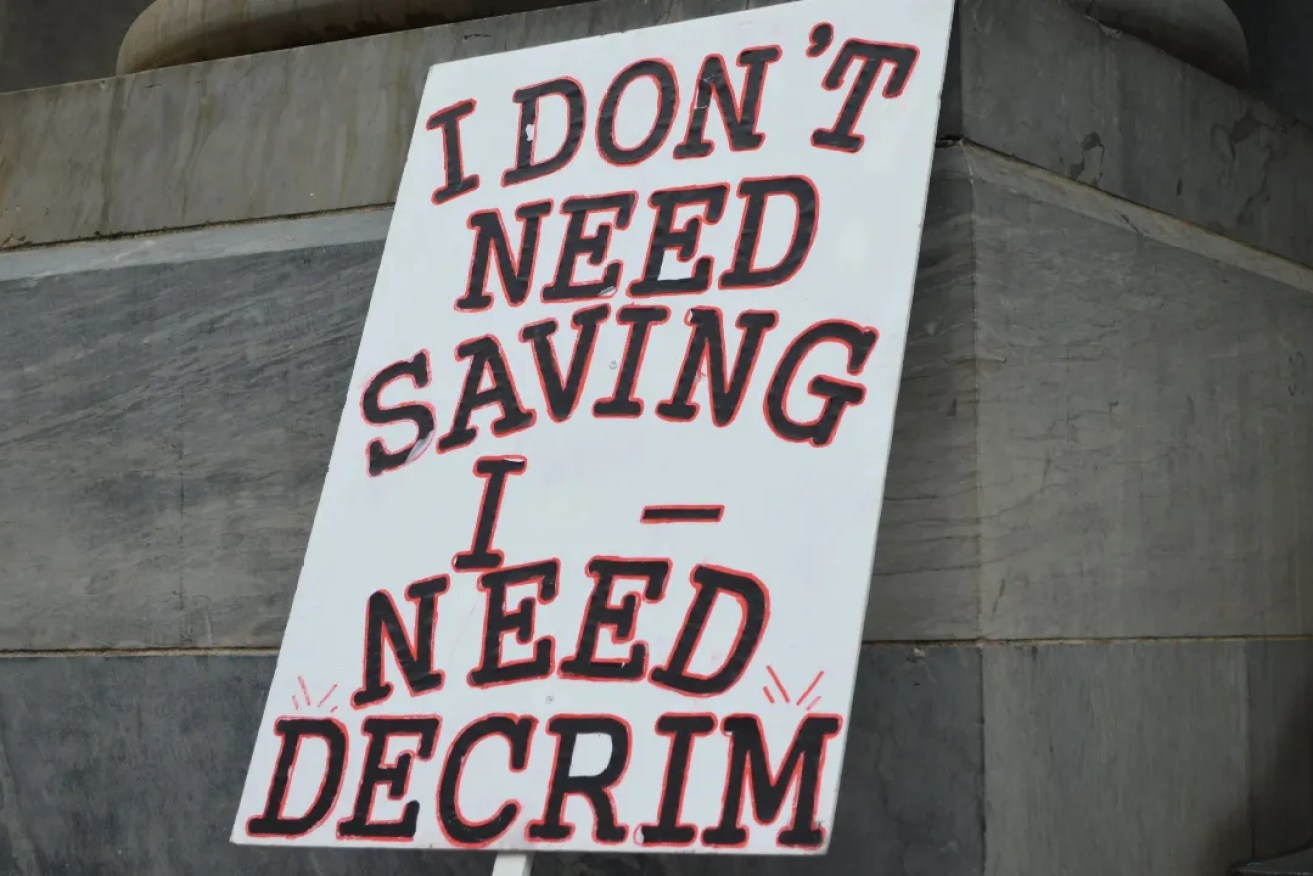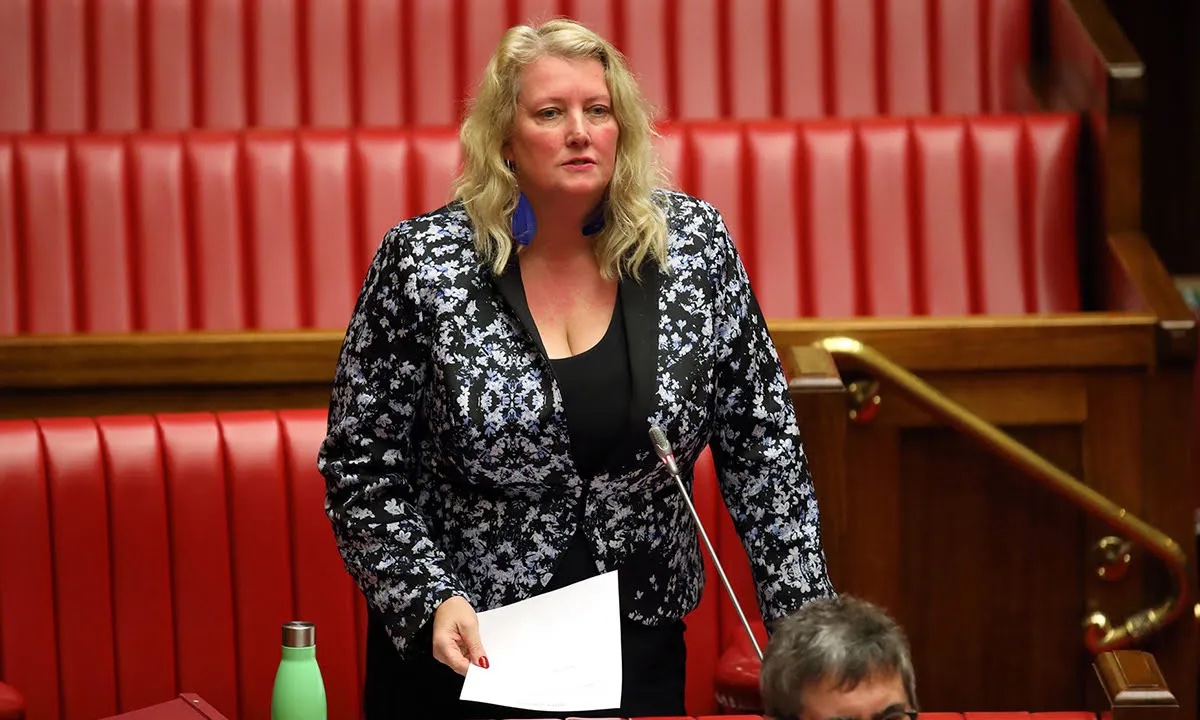Upper House to consider ‘Nordic Model’ sex work Bill
A Bill that would make it a crime to pay for sex in South Australia will be debated today in the Legislative Council – but some lawmakers and sex workers say it’s riddled with flaws.


Photo: Angela Skujins / InDaily
The Upper House will on Wednesday consider proposed amendments to the Summary Offences Act, introduced in August.
The proposed changes would make it an offence to pay for sex – criminalising those who engage sex workers – with hefty penalties including jail time for those caught.
Leader of the Opposition in the Legislative Council Nicola Centofanti told InDaily that she was aiming to remove demand for sex work in South Australia, with the Summary Offences (Prostitution Law Reform) Amendment Bill 2023 based on the regulatory model in effect in some Nordic countries.
If the Bill passes both the Legislative Council and the House of Assembly it would be an offence to request the provision of sex in exchange for payment, attracting a $2500 fine for the first offence and $5000 or one year imprisonment for subsequent offences.
It would also be an offence to have sex provided in exchange for payment, attracting a $5000 fine of one year in jail for the first offence and $10,000 or two years imprisonment for subsequent offences.
A person who procures a person to provide sex to another person in exchange for payment would also face a jail term of two years under the Bill – criminalising those who run brothels in South Australia.
Currently, it is illegal to operate a brothel in South Australia and sex work itself is criminalised under state legislation.
The approach is known as the “Nordic Model” by some because of where the approach originates from, but Centofanti told InDaily she preferred to call it the “Equality Bill” or the “Abolitionist Bill”.
“This piece of legislation isn’t all that radical, it’s come from many other countries around the world and a lot of those countries are actually seen as quite socially progressive,” Centofanti told InDaily, noting France, Sweden, Norway, Canada, Ireland and Iceland have implemented similar laws.
“This is the first Bill of its kind here in Australia, but I’m very keen for us to be the leading state in terms of women’s equality and I think South Australia boasts a remarkable history of pioneering gender equality, being the first place in the world where women successfully fought for the right to vote.
“I think this Bill is really a way to continue that work, but championing a model for prostitution that I believe creates a more equitable and respectful society.”
The overall effect of the Bill, if passed, would be to “target demand” – a simple proposition according to Centofanti.
“We know that market is supply and demand. If you target demand you thereby reduce supply because you don’t have a market,” she said.
“I’ve spoken with NGOs, social workers and police from other countries with the abolitionist or equality model that don’t have any issue fining pimps and brothel owners and clients.
“They team up and work directly together – police, social workers and NGOs – so that when these women are found they can immediately be given the counselling and the support services that they need going forward.”
Centofanti’s Bill contemplates assistance for those who would want to exit the industry too; section 26K provides that the minister would arrange assistance for those wishing to “no longer provide sex in exchange for payment”.
This would include the provision of information about government and other resources, education and training services, assistance in finding accommodation and employment, and help with accessing services provided by health and legal practitioners.
“That’s absolutely the most important provision of this Bill,” Centofanti said.
“This is not just about criminalising it for the client and decriminalising it for the seller, there is an entire provision in my Bill around ensuring that the Minister arranges assistance for people to exit the industry,” she said.
“You can’t do the rest without ensuring that there are adequate provisions for these women. Without these services, women won’t get the help that they need to exit the industry. The intent is to support these women to get out and find other employment.”
“I don’t see how it’s possible” – Tammy Franks, Greens MLC
The Bill has attracted the attention of lawmakers and some sex workers in South Australia, who are concerned about the effectiveness of the proposed Bill.
Tammy Franks, SA Greens Member of the Legislative Council, has sought to pass amendments to the state’s sex work laws in the past, most recently in 2019 when she supported a decriminalisation model.

Tammy Franks. Photo: Tony Lewis/InDaily
That Bill didn’t passs but it would have put South Australia in line with interstate jurisdictions like New South Wales where sex work is decriminalised and Victoria where legislators are pursuing decriminalisation over two stages to allow time for the transition.
Franks told InDaily that attempting to end the demand for sex work was a pipe dream.
“I don’t see how it’s possible,” she said.
“We’re not a culture that prohibits sex outside marriage. Obviously, we have laws about paedophilia, but we don’t generally prosecute on moral purposes around consensual adult sexual relationships and we haven’t for some time in Australian culture.
“At the moment, South Australia probably has the most archaic laws in the country when it comes to sex work. There have been over a dozen attempts at law reform from the 90s onwards, and none of them have succeeded yet which has left us in that position of having quite archaic laws that can be quite subjectively policed at times.”
Franks said Centofanti’s Bill “takes us in the opposite direction and seeks to re-criminalise sex work by focusing on criminalising the client”.
“I think that’s a problem because it doesn’t reflect the values of community and the realities of our life,” she said.
“I think people in South Australia believe that the police should be spending their time fighting real crime, not penalising adults that are having consensual sex.”
Her position is supported by both Human Rights Watch and Amnesty International, which have backed a decriminalisation model over the Nordic Model.
In 2019, Human Rights Watch said “full decriminalisation is a more effective approach to protecting sex workers’ rights”.
“The Nordic model appeals to some politicians as a compromise that allows them to condemn buyers of sex but not people they see as having been forced to sell sex. But the Nordic model actually has a devastating impact on people who sell sex to earn a living,” it said.
“Because its goal is to end sex work, it makes it harder for sex workers to find safe places to work, unionise, work together and support and protect one another, advocate for their rights, or even open a bank account for their business.
“It stigmatises and marginalises sex workers and leaves them vulnerable to violence and abuse by police as their work and their clients are still criminalised.”
Similarly, a 2016 policy document from Amnesty International looked at sex workers’ rights in Norway and found that “despite high levels of rape and violence by clients and organised gangs, sex workers have a high threshold for reporting violence to the police”.
“Amnesty International heard how some sex workers who have reported violence to the police in Norway have been evicted from their homes or deported as a result of engaging with the police,” the document said.
“Under Norway’s laws, sex workers are at risk of forced evictions as their landlords can be prosecuted for renting property to them if they sell sex there.”
The proposed South Australian laws do not contemplate evicting sex workers from rented properties if they sell sex there, but Franks said international experience with the Nordic Model found it “does put sex workers in danger”.
“Rather than being able to have not only the assistance of law enforcement but the freedom to work in a safer manner by requiring ID, these sorts of things are driven underground,” she said.
“When you criminalise the client you actually put the sex worker in further danger.”
Franks said South Australia should look to the east coast for guidance, especially to Victoria where the current two-stage approach means change can come into effect over a longer period.
“Sometimes you can’t necessarily move in one big step,” she said.
“I think there’s definitely scope for that with the South Australian Parliament, and if those steps are forward rather than backwards then at least we’re heading in the right direction.”
South Australian peer industry network for sex workers – SIN – held a forum last week about the “harms of the Nordic Model”.
SIN general manager Kat Morrison told InDaily that “sex workers don’t want it – it doesn’t work”.
“It’s incredibly harmful and creates barriers for sex workers. It retains the police as an element of the sex industry. We are concerned about how this legislation is going to be actively policed on the ground,” she said.
“If you’re trying to locate, arrest and charge a customer of a sex worker, the only way that we can reasonably consider that can be done is by surveilling sex workers – by standing outside of our workplaces, our homes, hotels, motels, wherever it is we’re working from.
“It’s a Bill that seeks to abolish the sex industry and that basically says you can ply your trade, you can advertise, you can offer your services, but you cannot be paid for those services. Where would we accept that kind of framework in any other industrial setting?”
Morrison said a decriminalisation model was the way forward.
“If the creators of this legislation are deeply concerned about women, the evidence is that decriminalisation, removing any mention of sex work or the sex industry from the Criminal Code, is absolutely the best way forward,” she said.
Ultimately, Franks called the Bill “the fantasy model”.
“It’s a flawed logic to think that you can end the demand for sex work,” she said.
“I’m more of a realist and a pragmatist than that, and I would rather keep people safe.”
But Centofanti said the decriminalisation model wouldn’t fit with South Australia.
“I think this model is a nice balance in that it decriminalises it for the women and allows them to have the support services to exit the industry and put the onus back on the buyers, the pimps and the brothel owners,” she said.
“We know that sex trafficking wouldn’t exist without the demand for prostitution services, and my model – the equality model – really targets the demand, unlike decriminalisation which has actually been shown to increase demand.”




